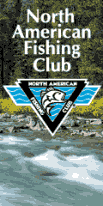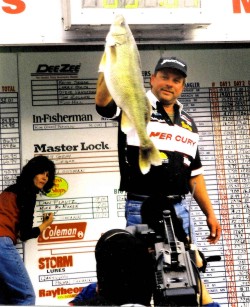 












Promotional
Team Favorites
Lodging food and more









|
Taking the Tournament Plunge
By JOHN KOLINSKI
It's 4 p.m. on a Sunday afternoon at a major fishing tournament, and
your
livewell is loaded with big fish for the second day in a row.
You've arrived at the weigh-in site, where you are picking up bits
and pieces
about how tough the bite was for the other first-day contenders. When
tournament officials tell you that you will be the final boat to weigh,
a
week's worth of tension leaves your body in one deep breath, replaced
by a
smile that won't go away for days.
In a few minutes, one of your dreams will come true when you step onto
the
stage to seal the deal and reap the rewards of your hard work and a
well-executed game plan. It's a day you will never forget and one for
which
you will be richly rewarded ...
The preceding scene is what drives most competitive anglers, and it
can
happen to anyone. However, in reality, big-time tournament success
is the
exception and not the norm for even the most accomplished anglers.
Ask a
dozen recent winners on the Professional Walleye Trail, RCL or Masters
Walleye Circuit, and most will tell you victory came when they least
expected
it.
Most veterans are content to compete with enough consistency over the
course
of an entire season to qualify for their circuit's championship.
Success does not come without a price, either. Beyond the equipment,
experience and skills required to succeed, it's also about commitment,
sacrifice and support.
There are more tournament fishing opportunities today than ever with
more
corporate sponsorship, larger purses and extensive media coverage.
If you are
serious about casting your line into the competitive river, you'll
also find
a level of competition that fits your experience and ability.
So what exactly are you getting into?
A beginning tournament angler should probably consider starting with
a
smaller local event. There is much to learn, from tournament procedures
and
ethics to actual angling skills and decision-making.
I think some degree of success is important, too, so pick an event
on a body
of water you know well where you can also tap plenty of sources for
up-to-date information.
Learn to do your own thing, because the reputation you develop will
follow
you as you progress up the competitive ladder. Nobody likes a tailpiper
who
lets others find the fish and then shows up on tournament day.
Your behavior on stage and while interacting with spectators and other
anglers is equally important, especially if you take the sport to its
highest
levels. Sponsors have no need for anglers who parade across the stage
in
dirty T-shirts and are unable or unwilling to communicate. Media
representatives are more likely to pursue an interview with someone
who acts
as an ambassador for the sport, as well.
On the water, you must be versatile. There is no single presentation
that
will always produce the right fish. At some point, you will need to
cast,
drag or bounce jigs. You will need to troll crankbaits on lead-core
line and
on planer boards. You will need to both drift and troll live bait.
You will
need to understand how to use snap weights and bottom bouncers. Take
the time
to learn them all so that when the situation arises you are able to
adjust.
Expect to spend some advance time on the water. For a two-day event,
most of
the top anglers arrive at least two or three days in advance to prefish
the
area. It's critical to find several spots that are holding fish and
to refine
your presentation until it is both productive and efficient.
Expect those prefishing days to be long and exhausting. My days begin
at
sunrise, even when the temperature is below freezing. I don't leave
the water
until late afternoon. Sometimes, if I'm on a particularly good bite,
I'll get
out even earlier or fish even later so I can check a certain spot when
few
others are on the water and reduce the risk of being seen.
Every hour of prefishing is important. Fish move and their moods change
with
weather fronts and changes in wind direction. To be successful, it
helps to
have dealt with as many situations at as many different times of day
as
situations as possible.
Many, many times I've seen tournament anglers heading for the boat
landing
after a couple of hours the day before an event begins, satisfied that
they've got enough going to give themselves a solid chance.
Most of the time, it doesn't work out that way. Experience has taught
me that
those last few hours can be the most valuable of all when it comes
to
fine-tuning a presentation or discovering one additional spot.
If you find new fish on the day before the tournament, chances are
they won't
stray far by the next day. I've been involved in several tournaments
where
the last hour or two put me onto something that caused me to scrap
everything
else I'd done over the preceding two or three days.
One of the most critical elements of an angler's education is the ability
to
assess the bite and what it will take to be competitive in a given
tournament. It only makes sense that the more spots you have to catch
the
fish you need, the better your chances. Somewhere, somehow, somebody
will
find a way to catch quality fish in any significant tournament.
Keep in mind that there aren't any timeouts, rain delays or half times
on the water, either. I've fished in 40 mph winds, driving rain, hailstorms
and blizzards. You must be willing to fish consistently unless extreme
wind
or lightning make it unsafe to be on the water. You simply cannot learn
anything drinking coffee at a restaurant or sitting in a motel room.
To do that, it's critical to be as comfortable as possible. You'll
need a
quality rain suit and plenty of cold-weather clothing.
 |
When your fishing day is done, the next couple of hours are spent cleaning
up the boat, refueling, running any necessary errands for bait or
tackle and rigging rods for the following day. Usually, around 8 p.m. or
so, it's time for a shower and dinner, followed by an information-sharing
meeting with
teammates or other sources. After five or six hours of sleep, the cycle
starts over. The farther you go in competitive fishing, the greater
the sacrifices and commitment. You'll spend more time away from your home
and family, and you
will need their support. |
You'll need time off work. And you will have an investment in travel and
lodging expenses. Finally, understand that only a handful of anglers
make a decent living off their sponsors and tournament winnings out of
thousands and thousands who
participate. The more you climb, the tougher the competition. My goal
is always to learn and improve, and to be consistent over the course of
an entire season. If I pick up a victory along the way, it's like a bonus
check for a job well done. The fact is, there will be more bad days on
the water than truly good ones. However, the bad days fade away while the
good ones live on forever. And that's what makes the tournament plunge
worth taking.
E-mail
John Kolinski

Fish
Clix Banner Exchange
Walleyes Inc. website is maintained
by Randy
Tyler Fishing the In-Fisherman Professional Walleye Circuit, Masters
Walleye Circuit and the Wal Mart RCL Circuit. All rights reserved.Copyright
1999/2003
Please visit these site sponsors
Daiichi/Tru-Turn Hooks,
Lindy
Little Joe,
R-A.M Mounting Systems,
Ranger
boats, Mercury Outboards,Bedford
Sales , Church Tackle, Panther
Marine Products,
Webfoots body sock,
Bait
Rigs Tackle ,Dual Pro Charging Systems,
Daiwa
Rods and Reels,
Driftcontrol
Wind socks,
Trojan Batteries
|


